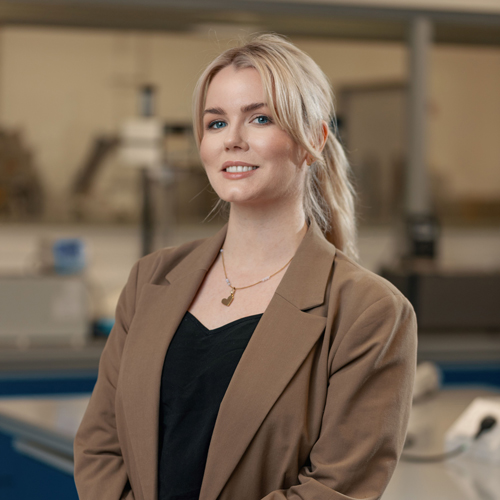
Pectin and functional fibre for texturizing and coating of plant based bars and snacks
Produktshow:
- Aerated/foamed Rice Crispy binder
- Fruit juice bars, bits
- Vegetable fruit juice snacks
Marlene Beicht, Region Stuttgart
Since 2020 Herbstreith & Fox GmbH & Co. KG
Area Manager Sales and Technical Service
Main region Germany
2019 – 2020 Herbstreith & Fox GmbH & Co. KG
Application Technologist Laboratory
2015 – 2019 University of Hohenheim
Master of Science Food Science and Engineering
2012 – 2015 University of Hohenheim
Bachelor of Science Food Science and Biotechnology
Special Interest and currently focus on:
- strong interest in product development, technical implementation, process optimization
- currently focus on: sugar reduction and replacement within many applications; enriched and fortified confectionery; plant based products and alternatives such as dairy alternatives
Or not quite as formal/scientific:
Passionate about Food, Science, Cooking, Nature and Plants.

Presentation of various solutions for the flexible and weight-accurate production of bars, from small to large scale.

The question of what is a bar and where the name comes from.
Categorization from a perspective as technologist.

Alternative proteins—such as legumes, fungi, and microalgae—are gaining attention as sustainable and nutritious ingredients for functional foods. Energy bars, thanks to their convenience and health appeal, are ideal carriers for these innovative protein sources. Several examples of their successful incorporation into bar formulations will be discussed.
The presentation will also focus on a case study involving the reformulation of energy bars with microalgae, specifically Spirulina and Chlorella vulgaris. These microalgae are rich in high-quality proteins and essential bioactive compounds. The results show that their inclusion significantly increased the bars’ protein and vitamin B12 content, while also affecting color, flavor, and texture—highlighting both the potential and formulation challenges of using microalgae in functional snacks.
Fabio Fanari is a Tenure Track Researcher in Food Structure and Functionality at IRTA (Institute of Agrifood Research and Technology) in Monells, Spain, a position he has held since October 2024. He earned his Ph.D. in Industrial Engineering from the University of Cagliari, Italy (2017–2021), where he also worked as a Research Fellow and later as a Postdoctoral Researcher in the Food Engineering area. From 2022 to 2024, he continued his postdoctoral research at IRTA, focusing on the food industry sector.
His research focuses on the valorization and functionalization of alternative protein sources—such as microalgae, pulses, and mushrooms—and their incorporation into food matrices to develop innovative food concepts. He investigates the relationships between food microstructure and texture to enhance product quality and functionality.
He has contributed to EU-funded projects, including ProFuture, Locality, and Giant Leaps, and has authored 27 scientific articles and a book chapter. He is also a peer reviewer for SCI-indexed journals and a regular presenter at national and international conferences.

- Physical and chemical properties of raw materials
- Processing aspects of mixing
- Product and machine requirements
- Process engineering solutions
- Cleaning and hygiene
- Scale-up
M.Sc Elisa Finck has been a food technologist and sales engineer at Glass GmbH & Co KG, a specialist for mixers, process systems and food machinery, since 2022. She supports customers in finding processes and optimising their challenges. From the initial consultation, to trials in the technical centre, through to commissioning on site. She completed her Master of Science in Life Science Technologies at the OWL University of Applied Sciences. Immediately after graduating, her path led her to a start-up. The company cultivates the raw material ‘microalgae’. Her task there was to bring them to food maturity and to develop and implement the necessary processes from the laboratory into a production facility.

Under the motto “We set the bar high!”, the companies SOLLICH KG and CHOCOTECH GmbH will be presenting state-of-the-art technologies and combined expertise for the production of high-quality confectionery products.
Dive into the world of innovative bar production!
What you can expect:
- Company introduction
Get to know the strengths and specializations of SOLLICH and CHOCOTECH – two leading machine manufacturers in confectionery and food technology.
- Product overview
Get an overview of our diverse systems and solutions for different bar types:
- Cereal bars
From binder production (CHOCOTECH) to forming (SOLLICH) – this is how crispy indulgent products are created.
- Protein bars
Experience how cooked and aerated protein masses with jelly centers are formed to perfection – an interaction between SOLLICH and CHOCOTECH.
- Candy bars
Learn more about the production of nougat and caramel (CHOCOTECH) and two-layer molding (SOLLICH) – including a discussion on the implementation of special products, e.g. coconut bars.
- Pure Foods / Fruit bars
We will also show you innovative approaches to continuous, gentle production in the area of fruit bar manufacturing.
You can look forward to exciting insights, technical innovations and the opportunity to exchange ideas with our experts.
We set standards – set the bar higher together with us!

In the past 4 years the German FMCG market has lived through a level of dynamic changes and impulses never-seen-before.
The pandemic and inflation have changed consumers and left a lasting mark and current framework conditions continue to keep the pace of change high.
The presentation will tackle one area which is key for success during these times – “Hypes, Trends, Megatrends” – why is it necessary to differentiate between these three?
What does that mean for confectionery and the bars segment?
I will answer these questions and am looking forward to receive even more during discussions at the event!
David Georgi
Thought Leadership Lead NIQ Germany
Has been with NIQ for 17 years in various roles, gaining experience on both the retail and manufacturing side of the FMCG industry. For the past 3 years, he has been primarily responsible as Teamlead Customer Success for the confectionery industry and the successful expansion of the Thought Leadership area at NIQ Germany, where he regularly conducts the popular “State of the Nation” and “Inflations” webinars.
He is an enthusiastic beneficiary and profiteer of the newly acquired FullView capabilities of NIQ & GfK, especially with regard to thought leadership topics
Translated with DeepL.com (free version)

- Protein bar shelf life
- Mechanisms of protein bar hardening — covering both animal and vegan proteins
- Methods to reduce hardening
- New research in bar hardening
Dr. Audrey Girard is an assistant professor specializing in food chemistry in the Department of Food Science at the University of Wisconsin-Madison. She earned a B.S. in Bakery Science & Management from Kansas State University and a Ph.D. in Food Science & Technology from Texas A&M University. Audrey’s overarching research goal is to use protein chemistry to improve food quality and sustainability, as well as to promote human health. Lab website: https://girard.foodsci.wisc.edu/

Short exposé of the presentation “We set the bar high!” by SOLLICH KG and CHOCOTECH GmbH
Under the motto “We set the bar high!”, the companies SOLLICH KG and CHOCOTECH GmbH will be presenting state-of-the-art technologies and combined expertise for the production of high-quality confectionery products.
Dive into the world of innovative bar production!
What you can expect:
- Company introduction
Get to know the strengths and specializations of SOLLICH and CHOCOTECH – two leading machine manufacturers in confectionery and food technology.
- Product overview
Get an overview of our diverse systems and solutions for different bar types:
- Cereal bars
From binder production (CHOCOTECH) to forming (SOLLICH) – this is how crispy indulgent products are created.
- Protein bars
Experience how cooked and aerated protein masses with jelly centers are formed to perfection – an interaction between SOLLICH and CHOCOTECH.
- Candy bars
Learn more about the production of nougat and caramel (CHOCOTECH) and two-layer molding (SOLLICH) – including a discussion on the implementation of special products, e.g. coconut bars.
- Pure Foods / Fruit bars
We will also show you innovative approaches to continuous, gentle production in the area of fruit bar manufacturing.
You can look forward to exciting insights, technical innovations and the opportunity to exchange ideas with our experts.
We set standards – set the bar higher together with us!
Curriculum vitae – Volker Günnel
CHOCOTECH GmbH – Director of Sales and Marketing
Jan. 2023–until today
CHOCOTECH GmbH – Area Sales Manager
Nov. 2006–Dec. 2022
Sales Areas: Germany, Switzerland,Austria, Australia, New Zealand,Japan, South KoreaSales Areas: Germany, Switzerland,Austria, Australia, New Zealand,Japan, South Korea
CHOCOTECH GmbH – Chocotech Innovation Center and Dipl. Ing. Studies at Hochschule Anhalt University of Applied Sciences
Dual study program March 2001–May 2007
CHOCOTECH – Apprenticeship
Aug. 1997–Feb. 2001
Industrial mechanic for mechanical and system engineering

The presentation is about “Healthier Snacking” – specifically enriched snack bars with functional ingredients such as plant proteins, fibre, and taste modulation. We will highlight market trends, consumer needs, and why the segment is growing strongly, particularly in terms of health, convenience, and sustainability. The aim is to showcase our solution expertise and support customers with market-ready concepts for healthier bar applications. We will present specific product examples that demonstrate our B2B ingredients in real-world applications.
Leon Haberstock is a Market Segment Manager at a leading global provider of natural, technology-based ingredients, ingredient systems & integrated solutions for the food and beverage industry. After completing his industrial clerk apprenticeship in 2024, he advanced into a position in market segment management, driving market strategy, segment development, and commercialization initiatives across international markets for the cereals & snacks segment.

Binders for bars need to provide sufficient stickiness to hold particulates together, but then not be too sticky in contact with packaging materials and fingers. This talk will review the concept of stickiness, what factors play into sticky bars and binders, and some potential avenues to control stickiness.
Dr. Hartel has been a Professor of Food Engineering at University of Wisconsin-Madison for 39 years, studying a variety of phase transitions of pertinence to ice cream, confections and chocolate.

In this presentation, we will explore protein bars with a focus on various plant-based proteins that can be incorporated. We’ll discuss the properties and functionalities of these proteins, examining how they contribute to the nutritional profile and texture of the bars. Additionally, we’ll delve into the taste aspects, highlighting how different plant proteins can influence flavor. Our goal is to provide insights into choosing the optimal plant-based proteins for creating delicious and nutritious protein bars.ickiness.

- 34 years of experience in mechanical and plant engineering at the NETZSCH Group
- 12 years as head of the global NETZSCH Grinding & Dispersing Business Unit
- Managing Director of NETZSCH Dry Grinding Technology, specializing in fine grinding and air classifying
- Co-inventor of various patents in the field of mechanical and thermal process engineering
- Since 2023, self-employed as a consultant and active in the development of new processes

- Background on Nukoko
- Nukoko product, technology, Ingredients range
- Functional benefits
- cost benefits
- sustainability benefits
Ross is a serial entrepreneur and has worked in the chocolate industry for over 10 years, founding previous brands in the UK.
Seeing the issue first hand within the cocoa supply change, he has sought with Nukoko to create a company that can provide a full solution to an industry that he loves.

In protein-based foods, off-flavors refer to undesirable tastes or odors that can arise from various factors during processing, storage, or due to the type and formulation of protein sources. These off-flavors can significantly impact the overall sensory experience of food products, such as protein bars, and may discourage consumers from enjoying them.
Drawing on a general understanding of taste perception, various strategies will be presented to effectively modulate and mask off-flavors in protein-based products.

OPTIBAR® collagen peptides enable high protein inclusion levels of 60–70% in nutrition bars while maintaining a soft, stable texture throughout shelf life. Furthermore, it serves as the first protein-based binder optimized for cereal bar applications. Validated for industrial-scale production, OPTIBAR® integrates smoothly into existing processing lines. Developed by GELITA, this solution addresses key formulation challenges—such as protein density, binding functionality, and shelf-life stability—delivering both nutritional and technological benefits in modern snack development.

Join us for an in-depth exploration of the formulation science behind high-protein bars. This session will delve into the chemistry of proteins, ingredient interactions, and how these influence texture, shelf life, and product performance.ctively modulate and mask off-flavors in protein-based products.
Dr Orla Power is an Associate Principal Scientist at Glanbia Nutritionals. Orla completed her B.A in Medicinal Chemistry at Trinity College Dublin and holds PhD in Dairy Chemistry awarded at University College Cork. Orla has over 10 years’ experience across dairy industry and research, encompassing protein ingredient formulation, protein applications, infant formula, and enzyme modification. She has expertise in the functional behavior of both plant and dairy proteins in bars, bakery, and beverage systems, producing products and ingredients that lend to excellent textures and nutritional profiles.

Bar manufacturers and brands are facing many challenges when formulating high protein bars. The main challenge is to select the right ingredients to reach high protein levels while preserving a good taste, soft texture and appealing appearance, while ensuring an efficient manufacturing process. This study investigated the differences between milk proteins, pea proteins, collagen peptides and other hydrolyzed proteins for high protein bars, focusing on purity of the ingredients and its effect on taste, texture and appearance, both after production and during shelf-life.
While most grains, nuts and seeds only contain lower levels of protein (between 10 and 20%), protein concentrates (protein content >50%) but mainly protein isolates and collagen peptides (protein levels >80%) are the ideal choice for high protein bars, as they are able to increase protein levels in a bar very efficiently. Collagen peptides contain more than 91% of proteins, which is very high compared to other protein ingredients on the market. In addition, collagen peptides have been shown to be one of the ingredients, together with MPI (milk protein isolate), hydrolyzed pea and hydrolyzed casein, that can induce fast dough formation by gluing ingredients together and ensures a good dough consistency. Moreover, while most protein sources might have a negative impact on the chocolate color of a protein bar and on smoothness of the bar surface, collagen peptides, MPI and acid casein make sure that a good dark chocolate color is kept and the bar has a good smooth appearance. Next to this, every protein source has a very different and distinct effect on texture of protein bars. While most hydrolyzed proteins have been shown to induce bitterness, collagen peptides didn’t have this effect. While some protein sources lead to graininess, flavour reduction or in general induction of an off-taste, this is not the case for whey protein concentrate, whey protein isolate and collagen peptides. Finally, while most protein sources induce hardness, there are only a limited amount of protein sources that induce softness that is consistent during shelf-life (>12 months). This makes collagen peptides unique. However, not every collagen peptide is the same and it is crucial to select the right collagen peptide parameters to ensure the highest bar quality. Moreover, bar manufacturers could leverage the health benefits that collagen peptides bring to the bars, positioning the final products in multiple segments, such as beauty bars, fitness bars, etc. truly revealing the full potential of a functional high protein bar.
Dr. Chiara Roye (Belgian) is Application Development Engineer & Lab Coordinator at PB Leiner. She holds a doctoral degree ( PhD) in Bioscience Engineering, specialized in Food Science and Technology from the KU Leuven. Chiara started her career as a PhD researcher in the research group of Prof. Jan Delcour and Prof. Christophe Courtin , in the Laboratory of Food Chemistry and Biochemistry (KU Leuven). She focused on improving nutritional properties and health benefits of dietary fiber starting from wheat and oat bran using extrusion-cooking. Since 2020, she has been working at PB Leiner as Product Application Specialist Health and Nutrition, providing technical and application support to customers, agencies, prospects etc. for the use of SOLUGEL® Collagen Peptides in food applications. In her current role, she is responsible to manage lab work related to application, innovation and R&D projects within PB Leiner. In 2021, the lab team worked on an extensive application project related to understanding the functionality of SOLUGEL collagen peptides in high protein bars, of which she was project manager and technical R&D lead.

Categorization from a perspective as technologist.

In an era where consumer preferences evolve in real time, traditional research methods often lag behind. This presentation unveils the findings of a recent UK-based study that harnessed the power of social listening to decode what consumers are really saying about snack bars online. By analyzing organic conversations across social media platforms, we identified emerging trends, unmet needs, and evolving attitudes toward ingredients and formats. The session will explore how these insights translate into tangible opportunity spaces for innovation in the snack bar category—highlighting ingredient preferences, flavor expectations, and health-conscious demands. Attendees will gain a fresh perspective on how to align product development with the authentic voice of the consumer.
Quentin Schotte is Marketing Manager at Cargill, where he focuses on driving the marketing activities in culinary and snacking for Cargill’s Food enterprise. Before joining Cargill, he held marketing roles at Owens & Minor and Sibelco, gaining experience across different industries. He studied at Vlerick Business School and enjoys working at the intersection of creative marketing, and real-world impact with customers.

Products and their challenges.
SnackFix technology to overcome these challenges.

presentation of the most important plant-based proteins for sweet bar recipes with focus on taste, characteristis and functionality:
- pea protein
- favabean protein
- almond protein
- sunflower protein
- rice protein
- wheat protein
- soya protein
- chickpea protein
- peanut protein
Sensoric tests are possible. Product samples are showcased.

In this presentation we are focussing in rework reduction, saving ingredeints and be more sustainable in a bar manufacturing process.

This presentation explores the strategic use of chicory root-derived fibres (specifically inulin, oligofructose), and short-chain fructooligosaccharides (scFOS)—to reformulate cereal and protein bars by reducing sugar content, increasing dietary fibre, and enhancing nutritional properties. These non-digestible carbohydrates offer partial sweetness, improve gut microbiota composition, and contribute to caloric reduction, while maintaining product texture, moisture retention, and sensory quality. Their physicochemical properties and synergistic interactions with other macronutrients make them ideal for clean-label, fibre-enriched formulations that meet evolving nutritional standards
I hold a master in food engineering and I’m an experienced technical professional with more than 20 years of experience in food industry. Since 2020, I have been with BENEO as a Customer Technical Support specialist. My career spans roles in academia and industry, including positions such as Head of Quality & Food Safety, Development & Application Manager, and Technical Manager.
